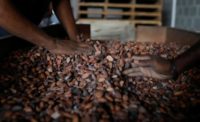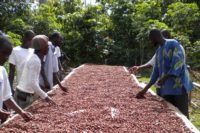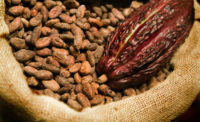When Yao N'Dri Pasca was having a problem with black pod disease on his cocoa farm, he turned to pesticides.
However, after going through a Cargill farmer training program, he learned new ways to combat the problem, and was able to reduce his use of pesticides. And, in addition to high quality cocoa beans, he also ended up with a rejuvenated farm. That, in turn, meant a higher income.
The Ivorian farmer is part of the ECASO cooperative, and one of the many farmers who have benefited from Cargill’s sustainable cocoa program this year.
But it’s not just about Pasca’s personal income. Because of the program, he and his fellow farmers were able to boost funding for the cooperative, which in turn was able to build a new school with three classrooms; renovate three other schools; and build a farm equipment and materials shop.
In fact, during the 2011-12 crop year, about 26,500 Ivorian farmers across 43 UTZ and Rainforest Alliance certified cooperatives received Cargill's sustainable cocoa premiums payments totaling $7.6 million — the highest ever pay-out for farmers in the region.
The premium payments recognize farmers for their efforts to increase yields and improve bean quality by decreasing moisture and mold content. The end goal is to continue to raise the quality of Ivorian cocoa beans.
This year, the average farmer received about 17% more revenue because of the payments. And, nearly 20% of Cargill’s cocoa supply is now certified sustainable cocoa, the company says.
The program is sustained by Cargill's customers who buy certified cocoa and chocolate ingredients. As such, over the last three years, Cargill's premium payments to Ivorian farmers have totaled more than $12.2 million.
Cargill is continuing to invest more than $3 million a year in financing, training and support to the Ivorian cocoa community to maintain and strengthen the sustainable cocoa supply chain.The program also supports communities with education and health programs.
And, 87 cooperatives have been certified and another 25 are starting the program, which now reaches more than 60,000 Ivorian farmers.
The company’s goal is to source more than 100,000 tons of certified sustainable cocoa beans from Cote d'Ivoire by 2015 — making its program the largest of its kind in the country.
"We are proud to recognize the efforts made by the Ivorian cooperatives, farmers and the cocoa growing communities towards creating this sustainable supply chain for cocoa," says Jos De Loor, president for Cargill Cocoa and Chocolate.
And the program doesn’t stop in Cote d'Ivoire. As a result of its success, Cargill has expanded its farmer training activities to Ghana, Cameroon, Brazil, Vietnam and recently Indonesia.
Thanks to Cargill, Ivorian cocoa farmers ‘in the money’
Sustainability program raises average income by 17% for participating farmers.

Looking for a reprint of this article?
From high-res PDFs to custom plaques, order your copy today!






